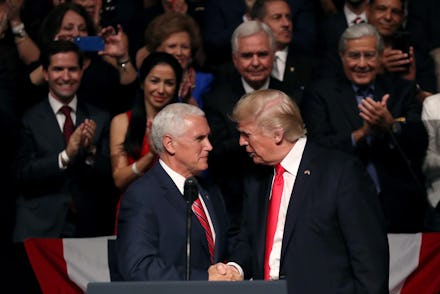The election commission’s woes are Mike Pence’s problem now

The national drama over a federal commission on election integrity has come home to roost — at the White House.
Most of the darts flying over the panel and its massive request for voter data have been aimed at the panel’s vice chairman, Kansas Secretary of State Kris Kobach.
But the actual boss of the panel, created after President Donald Trump claimed without evidence that millions of voted illegally in the 2016 elections, is Vice President Mike Pence. And until now, he’s ducked the negative attention in the face of what’s become a nationwide backlash against the commission.
On Thursday, a spokesman for Pence went on television to confront the matter of Kobach’s request for sensitive voter data including Americans’ election participation records, party affiliation, military and criminal history and even partial Social Security numbers.
“One of the things I think you’re seeing is a little bit of partisanship and some gamesmanship by a few states,” Pence spokesman Marc Lotter said during an appearance on Fox & Friends.
“It should be noted that most states, about 36 right now, are actively working with the commission or are looking at the request from the commission to see what they can release publicly under their state laws,” Lotter continued. “It’s important to note that all the commission is seeking is publicly available data — data that states on a regular basis provide to campaigns, state political parties and other national groups.”
“Really, the question you have to ask is for those 14 states that say they are not going to comply is, ‘What are they trying to hide?’” Lotter asked. “What are they covering up, or is this just pure partisanship that they may be ignoring their own state laws and their own public records laws in terms of what they can release and should release to the commission?”
Lotter’s argument is at odds with published reports that officials from more than 40 states — both Republican and Democrat — have refused to cooperate with the commission’s data request, citing privacy or legal concerns. Meanwhile, watchdog groups are calling the commission as a whole a racist “dog whistle” geared at voter suppression.
Rick Hasen, a professor of law and political science at the University of California, Irvine, who has been sharply critical of the voter panel on his Election Law Blog and in writings elsewhere, told Mic the Lotter appearance “certainly ties the vice president closely to the work of the commission.”
“It is most unusual to have a commission headed by someone who is a candidate for re-election, debating the best election rules for an election the chair himself will run in,” he added, dryly.
This is hardly the first time Pence, who didn’t even have the current president as his first choice for GOP nominee last year, has had to use the skills he gleaned from years in both media and radio to defend Trump’s positioning.
Darrell West, vice president and director of governance studies at the Brookings Institution, said on Thursday that Pence has to take responsibility “because he is the formal chair” of the group.
“[Members of Pence’s team] are the ones guiding the effort and pushing for further analysis,” West said. “They clearly see this as a vehicle to crack down on fraud and enact more stringent voter-suppression rules in the future. People should not ignore Pence in all the discussion over Kobach, because he also has spoken about fraud and exaggerated its scope and impact.”
Larry Sabato of the University of Virginia’s Center for Politics said in an email interview that it was “absolutely” Pence’s problem.
“He knows very well that there is nothing to Trump’s claim of 3 to 5 million illegal votes, or even any substantial vote fraud in 2016,” Sabato said. “Yet he’ll have to find a way to create enough doubt about fraud to please the boss and give Trump enough ‘facts’ to justify his bluster.”
On the flip side, Robert Popper, who heads the Election Integrity Project at Judicial Watch — a self-described “conservative, nonpartisan educational foundation” — insisted there’s nothing to see here.
In a video released Thursday afternoon, Popper, a former deputy chief of the Voting Section of the Civil Rights Division of the Department of Justice, said, “We at Judicial Watch routinely ask states for their voter registration rolls. And we get them.”
“Private marketing groups get ahold of these voter registration lists all the time. They’re for sale, they’re exchanged. The idea that the Trump administration is doing something outrageous is nonsense,” Popper said. “What they’re doing is gathering data on voter registration that we’ve needed for years.”
Even if that’s the case, the election integrity panel seems in no hurry to face in-person questions about its mission when it meets for the first time July 19. According to the Federal Register, the commission will only accept written comments from the public at this first meeting, though individuals will have the opportunity to make oral comments at future gatherings of the panel.
Neither a Pence spokesman nor the federal worker designated as the panel’s contact responded to Mic’s requests for comment.
Allegra Chapman, director of voting and elections for the government accountability group Common Cause, said keeping the public away is a way “for the government here to control the narrative.”
If the commission can quash questions about “methods or tactics or the data that they’re using,” Chapman said in a phone interview, it is more free to push a pre-ordained agenda.
What agenda might that be? “Continuing to spread this fear, this myth, that there is widespread illegal voting going on across the country — and that states should be sort of putting into place some new restrictions based on that,” she said.